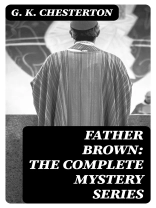‘Father Brown: The Complete Mystery Series’ by G. K. Chesterton encapsulates a unique blend of mystery and philosophical inquiry, following the keen observations of a humble parish priest as he unearths the hidden motives behind a series of intricate crimes. Chesterton’s distinctive use of ironic prose and vivid imagery is evident throughout the narrative, reinforcing themes of faith, morality, and human nature amidst the vividly rendered criminal landscapes of early 20th-century England. Rooted in the burgeoning detective fiction genre, these stories transcend mere whodunits, engaging with allegorical elements that invite readers to contemplate the broader mysteries of existence and the duality of man. G. K. Chesterton (1874-1936), known for his sharp wit and unorthodox perspectives, was heavily influenced by his own spiritual journey and the social issues of his time. His experiences as a journalist and public intellectual allowed him to delve deeply into the human condition, shaping Father Brown into a character who embodies compassion and insight. This unique priest-detective reflects Chesterton’s belief in the redemptive quality of mystery and the complexity of sin and virtue, making his stories both entertaining and thought-provoking. This comprehensive collection is a must-read for those who appreciate well-crafted narratives infused with philosophical depth. Chesterton’s Father Brown not only entertains but also challenges readers to examine their own moral框架s, making it an essential addition to any literary enthusiast’s library.
Circa l’autore
Gilbert Keith Chesterton (1874–1936) was an eminent English critic, philosopher, theologian, and author, widely known for his wit, wisdom, and distinctive literary style. His prolific output includes journalism, philosophy, poetry, biographies, and a series of detective stories featuring the character Father Brown. ‘Father Brown: The Complete Mystery Series’ remains one of his most celebrated works, wherein Chesterton subverts the traditional detective genre with a crime-solving Roman Catholic priest. This character personifies Chesterton’s own theological beliefs and is marked by his sharp understanding of human nature. Unlike many of his fictional contemporaries, Father Brown was driven by intuition and morality rather than procedural investigation. Chesterton’s writing is characterized by paradoxes, metaphysical puzzles, and a deep sense of humanism. His work has had a lasting influence on both the mystery genre and Christian apologetics, with ‘The Man Who Was Thursday’ and ‘Orthodoxy’ regarded as classics. He debated many key intellectuals of his time, and his legacy persists through the G.K. Chesterton Society and ‘Chesterton Review, ‘ a journal dedicated to his life and work. His broad body of work and unique literary voice have earned him a permanent place in English literature.












